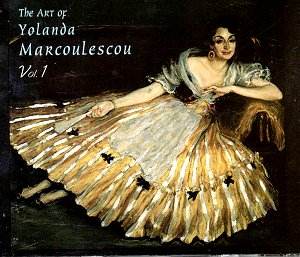
The Art of Yolanda Marcoulescou-Stern Volume
1
Giacomo MEYERBEER (1791-1864)
Dinorah – Allons vite
Les Huguenots – Noble signeurs, salut!
Ambroise THOMAS
(1811-1896)
Mignon – Je suis Titania
Jules MASSENET
(1842-1912)
Manon – Restons ici
Manon – Je suis encore
Gustave CHARPENTIER
(1860-1956)
Louise – Depuis le jour
Nicolas ISOUARD
(1775-1818)
Le Billet de Loterie – Non, je ne veux pas chanter
Georges BIZET (1838-1875)
Les Pêcheurs de Perles – Me voila seule
dans la nuit
Jacques IBERT (1890-1962)
Deux Stèles Orientées *
Aria (Vocalise) *
Albert ROUSSEL
(1869-1937)
Deux Poemes de Ronsard *
Ode XVI Sur lui-même
Ode XLIV Sur un songe
Sarabande
Le Bachelier de Dalamanque
Des fleurs font une broderie
Réponse d’une épouse sage
Amoureux séparés
À un jeune gentilhomme
A Flower Given To My Daughter
Light
Adieux
Odelette
Jazz dans la nuit
Erik SATIE (1866-1925)
La Statue de Bronze
Daphénéo
Le Chapelier
Tendrement
La Diva de "l’Empire"
Je te veux
André CAPLET
(1878-1925)
Écoute *
ROLAND-MANUEL (1891-1966)
Deux Élégies *
Arthur HONEGGER
(1892-1955)
Quatre Poèmes;
Sur le basalte au portique des antres calmes
Peuple du Christ j’expose en un ostensoir lourd
Mon Dieu
Toute seule
Claude DEBUSSY
(1862-1918)
Aquerelles;
Green
Spleen
Chevaux de bois
Le jet d’eau
Mandoline
Trois Chansons de France
Colloque sentimental
Fantoches
Maurice RAVEL (1875-1937)
Sainte
Epigrames de Clément Marot;
D’Anne qui me jecta de la Niege
D’Anne jouant de l’Espinette
Chanson du rouet
Manteau de Fleurs
Noëls des jouets
Les grands vents venus d’outremer
Sur l’herbe
Ronsard à son âme
Rêves
Florent SCHMITT
(1870-1958)
Si
Privilèges
Ses deux yeux
Le soir qu’Amour
Trois Chants Op 98
Georges ENESCU
(1881-1955)
Seven Songs Op 15
![]() Yolanda Marcoulescou-Stern (soprano)
Yolanda Marcoulescou-Stern (soprano)
Katja Phillabaum (piano) except
Robert Goodberg (flute) *
Unattributed orchestra and conductor in the
operatic selections
Recorded pre 1968 (operatic selection) and post
1974 remainder
![]() GASPARO GG3-1004 [3 CDs 209.50]
GASPARO GG3-1004 [3 CDs 209.50]
purchase through CCNow